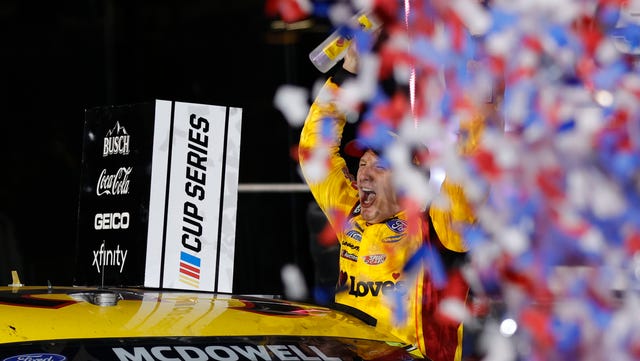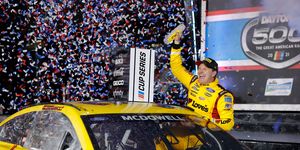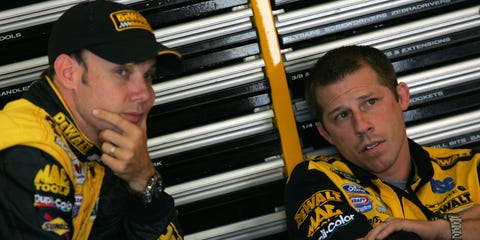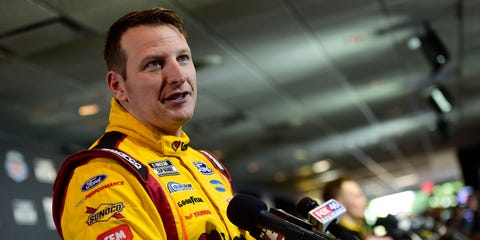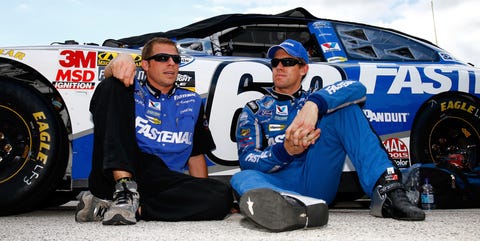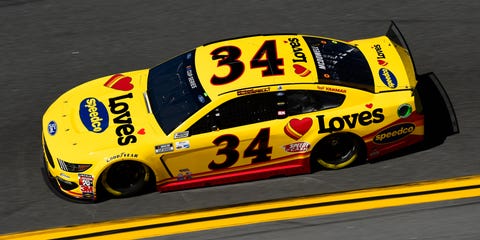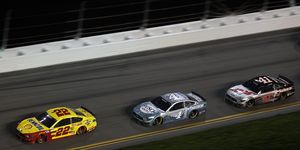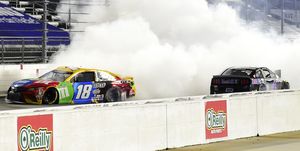It’s late on the evening of July 4, 2011, David Ragan is celebrating his victory in the Coke Zero 400 at Daytona and crew chief Drew Blickensderfer is on top of the world.
Meanwhile, Michael McDowell was halfway home, driving back to North Carolina after parking his Phil Parsons Racing entry in the garage just two laps into the race — collecting around 10 percent of the $83,000 for having made the race as a start and park.
That doesn’t go very far in NASCAR circles, especially with life insurance, and McDowell is simply trying to survive.
Blickensderfer and McDowell didn’t realize it at the time, but their destinies would eventually converge and coalesce back at the World Center of Racing almost a decade later.
At 33-years-old, Blickensderfer was considered a wunderkind, and was drawing comparisons to Chad Knaus. His victory with Ragan was his third in 60 starts and it was the second time he won at Daytona International Speedway.
His first two wins were the stuff of legend and felt like a preamble to an epic career.
Roush Fenway Racing promoted him from the Xfinity Series to work with Matt Kenseth in 2009, his first assignment at the highest level of the discipline, beginning their tenure with a victory in the Daytona 500.
For an encore, he took the 2003 champion to victory lane again, seven days later at Auto Club Speedway in Southern California. Blickensderfer was the architect who seemingly revitalized Kenseth after a winless 2008 season.
They were calling him Mr. Perfect.
But the honeymoon was short lived, the No. 17 returning to mid-pack status and Blickensderfer was reassigned after the 2010 Daytona 500. By that summer, ‘Blick’ was paired with Bayne, where they won the July Daytona race the following year.
“People just call me Blick, it’s just a lot easier,” he says.
Not much else came easier for Blickensderfer, who struggled to replicate his Roush Fenway Xfinity success in stints with Richard Childress Racing and Richard Petty Motorsports. A consummate racer, Blickensderfer is a mechanic and manager that teams always want around but could never provide him enough to race for wins.
“I never lost faith that I wouldn’t (get back there) again,” Blickensderfer said. “But there are days that it’s hard.
“There are days where I ask: ‘Why am I beating my head against the wall, if you don’t have a chance to win?’ It’s not always fun working these hours, doing this, being gone from your family for a long time. Is that worth it?
“But it is, because of the chance.”
A man of devout faith, McDowell has persevered on ‘the chance’ that someday it would be worth it, too.
Similar to Blickensderfer, McDowell was once considered a can’t miss prospect across multiple disciplines. He captured the Pro Mazda (Indy car) championship in 2004 before a lack of funding forced him to pivot to sports cars.
He changed course again, moving to stock cars full-time in 2007, where he finished second to Frank Kimmel in the ARCA Racing Series championship. That earned him a short-lived Michael Waltrip Racing Development contract.
His most famous claim to fame was a vicious rollover crash during qualifying for the April 2008 Cup Series race at Texas Motor Speedway. He broke a sway bar and hit the Turn 1 wall at 185 mph and flipped several times before coming to a stop in the apex before Turn 2.
“It was a cool crash,” he concedes to this day.
He spent much of the first half of this past decade as a start-and-park driver. In fact, he was only running at the finish in 17 of his first 120 starts at the highest level of the discipline. It was only a handful of Xfinity Series appearances with Joe Gibbs Racing from 2011-2014 that kept him competitively relevant.
But, mostly, he raced from the other side of the garage and for teams that didn’t finish or barely met minimum speed.
It was a slog.
“When you show up to the racetrack and you know that you’re — I don’t even know how to say it — you’re just in the way, taking up space, it’s hard to do that year after year and week after week,” McDowell said. “So, you’ve got to have a bigger purpose than that. For me, it was knowing that I would get an opportunity eventually.”
That opportunity first came in 2015 when Leavine Family Racing hired McDowell to drive cars that were mid-pack at best. But for the first time in his career, he was with an organization that was on an upward trajectory.
The No. 95 was on such an upward path that it hired Kasey Kahne when he became available in 2018, leaving McDowell again searching for the next competitive opportunity. He quickly landed at Front Row Motorsports but needed a crew chief.
Enter Blick.
Blickensderfer first became a top engineering prospect in 2008 when he served as the Xfinity Series crew chief for Carl Edwards. That pairing proved so successful that Edwards never challenged his calls or adjustments. They won seven times, eventually leading to his promotion with Kenseth.
It was Edwards who told McDowell that he needed to go after Blickensderfer, and they’ve quickly elevated the No. 34 team together.
“Michael and I, we have a super honest relationship,” Blickensderfer said. “And it’s really good, where we can go into the lounge and I can say, ‘Hey, you screwed this up, and he trusts me and he says, ‘Okay, let’s look at that.’
“There are a lot of race car drivers that race on Sunday where if you said that, you’d be looking for a job the next day. …
“The fact that Michael and I put our egos down and do whatever it takes to be better, that’s worked out really well.”
But it’s still challenging for Front Row to match the resources and personnel of Stewart-Haas, Hendrick, Gibbs and Penske each week. Even at their best, McDowell and Blickensderfer are bringing a knife to a gunfight.
“When I go to Charlotte and it’s the Coke 600, it’s like, this probably isn’t going to be a great weekend or a great chance to win,” Blickensderfer said. “But when I come to Daytona and Talladega with Michael and when we came to Daytona road course last year, those are chances, and you believe you have that opportunity.”
It always comes back to belief and conviction with these two.
Even as McDowell’s winless streak in the Cup Series reached 0-100, 0-200, 0-300 and 0-358, he never doubted.
“I know it sounds crazy, but no,” McDowell said. “Y’all could ask my wife because she’s more realistic, and she’s just like, ‘Man, I don’t think it’s in the cards.’ For whatever reason, I don’t know, I’ve been like, ‘It’s going to happen. I just know it is.”
He says that if he didn’t feel that way, then what was the point of any of this?
“Even when I was start-and-parking, I was like, ‘Man, one day I’m going to get a shot at it, and I’ll be able to do it’ because of everything that’s happened and all that I put into it. I never lost hope of that.
“And when I come to the racetrack, when we load up and go, I really think every weekend, ‘Okay, this is the weekend it’s going to happen. And I know that sounds crazy, but I do, and I have, and I have for a long time.”
That perseverance paid off with their upset victory on Sunday in the Daytona 500.
But don’t confuse upset for fluke.
Since joining forces with Blickensderfer at Front Row Motorsports, their No. 34 has been a threat to win each February at Daytona. They finished ninth in 2018, fifth in 2019 and 14th last year. From the very moment he arrived as a Cup Series crew chief, Blickensderfer knew how to manage a superspeedway program and McDowell knew what to do behind the wheel of one.
For all the start and parks, pink slips and near misses, McDowell’s journey culminated with the Harley J. Earl Trophy.
“As weird as it sounds, while I was doing it, I sort of knew that this was the reason why – not the Daytona 500, but that I would eventually get an opportunity, and you just never know if that works out,” McDowell said. “But it did.”
Lost in McDowell’s 0-358 was that Blickensderfer was 0-312 since his last win at Daytona in 2011. Before winning with Kenseth in his first two Cup starts atop the pit box, he had won three of the final four in the Xfinity Series with Edwards, too.
His teams made it look easy and he took for granted how challenging this industry can be.
“We were like, man, this winning thing comes pretty often, like everything is going good, and then, ‘uh-oh,’ it doesn’t happen,” Blickensderfer said. “There was the (2011) Daytona 500 with David Ragan and we get black flagged, Trevor Bayne wins it and we were lucky enough to come back and win the July 4 race.
“I always said, if I get that chance again, I’m going to soak it up a little bit. I sat on the pit box when it was over and I was pretty sure we won, but I didn’t want to think about it. The guys were celebrating, and I thought, ‘Man, I don’t want to think about this, what could happen.
“When they said, ‘34 to Victory Lane,’ to be honest with you, I was tearing up. It was something that I don’t take for granted anymore. I probably did 10 years ago. It’s definitely special to win in this series and it’s going to be enjoyed, that’s for sure.”
Blickensderfer is back on top of the world and brought McDowell with him for the ride.
Source: Read Full Article

